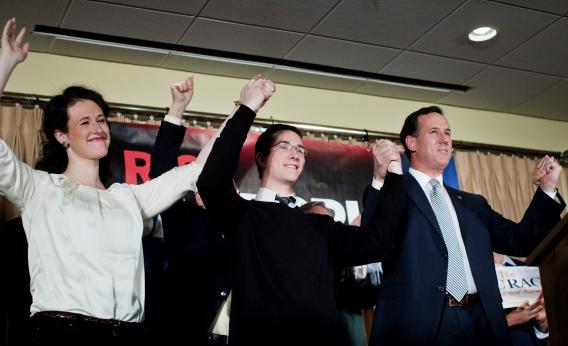Rick Santorum’s Iowa caucus win back in January came in large part thanks to massive support from evangelicals and other social conservatives clustered in the western half of the state. His defeat of Mitt Romney, like Mike Huckabee’s win over Romney four years ago, was interpreted as a reminder of the potency of this critical piece of the Republican coalition.
But as Ben Jacobs writes, despite lingering outrage over the Iowa Supreme Court throwing out the state’s gay marriage ban as unconstitutional in 2009, many local GOP activists seem to be sidestepping the Culture Wars. When it comes to taking out the state senator, Democratic Majority Leader Mike Gronstal, more responsible than any other for protecting that court ruling, pragmatism is the new name of the game:
Now, less than five months before Election Day, leading social conservatives in the Hawkeye State are simply focused on “hold[ing] Gronstal in check,” in the words of leading conservative activist Bob Vander Plaats. Not only that, they are shifting emphasis from social issues to economic ones, in an attempt to capture some momentum in the district.
Craig Robinson, a leading conservative activist in the state and founder of theiowarepublican.com, notes that “the marriage issue always plays somewhat, but it’s not what the entire race is going to be about.” Instead, Robinson emphasized the failure of the Iowa Legislature to pass tax reform, which he blamed on Gronstal. This was echoed by Gronstal’s Republican opponent, Al Ringgenberg, who said, “The number one issue I’ve noticed is property tax reform.” Robinson also downplayed the significance of the race, noting Gronstal’s “incumbent advantage” and adding that it was more important for Republicans to simply take back the Senate rather than claim Gronstal’s scalp. This was echoed by Vander Plaats, who said he and his organization, the Family Leader, were as focused on keeping Gronstal “pinned down” to prevent him from helping other Democrats “as defeating him.”
Taking back the Iowa Senate is not the only concern of many Iowa social conservatives; they also want to take back their own party. Steve Deace, a nationally syndicated talk radio host and prominent local activist, noted a real lack of conservative enthusiasm on the ground in Iowa. He said there’s “much more discussion among conservatives about what is the purpose and point of the Republican Party than about Mike Gronstal.” Instead of blaming Gronstal for the local GOP’s failures, they’re blaming the Republicans who failed. In fact, Deace actually praised Gronstal’s leadership, saying conservatives “could use a few Mike Gronstals on our side.”
The GOP is also putting up an imperfect candidate. Al Ringgenberg is a retired JAG prosecutor in the Air Force who likes to go by “Colonel Al.” Prominent Democratic insiders variously described Ringgenberg as “a goofball” and “pretty goofy.” He has also posted weak fundraising numbers: His campaign committee, “Patriots for Colonel Al,” had less than $7,000 on hand according to its most recent report. When I talked to Ringgenberg, he felt confident that he’d have the money he needed. Colonel Al was about to mention what he thought his campaign’s budget would roughly be, but then he backed off, saying that he was going to use “Sun Tzu military tactics, not going to give it away.” Instead, he merely noted it would be both “realistic” and “sizable.” Ringgenberg did note later that he thought it would be a “conservative wave” during which he could be outspent by a margin of 7- or 8-to-1 and still prevail.
In contrast, Gronstal, who could not be reached for comment, has almost half a million dollars on hand, including significant donations from out-of-state gay donors who support his efforts on marriage. This makes a difference, as Council Bluffs is in the Omaha media market, which has the most expensive television advertising in the state. As Iowa-based Democratic consultant Mark Langgin noted, based on the cost of the advertising as well as the flawed Republican candidate, the race just isn’t an efficient one for Republican strategists to focus on. Further, Gronstal doesn’t just have a massive financial advantage, but according to one well-placed state Democrat, organized labor already has staff on the ground supporting him in addition to his own campaign workers.
This should be a race that Republicans can win. It’s a vulnerable incumbent in a tossup district who has already alienated many swing voters with unpopular stands. But it says something about the salience of social issues in November that in southwest Iowa, Republicans don’t feel comfortable running on gay marriage against a politician for whom that has been his signature issue.
Even the most committed conservative activists are showing some ideological flexibility here. They know voters are more focused on the economy than anything else, and seem to be acknowledging that gay-baiting might cause a backlash, potentially alienating suburban women and other moderate voters up for grabs.
That a focus on social issues appears, in 2012, to be working almost exclusively to the benefit of Democrats marks quite the departure from the 2004 presidential election and national races generally over the past few decades. Since the 1960s, the story goes, working class whites have been slowly drifting from the Democratic Party as it has become more associated with identity politics and rights-based struggles for women, blacks, and gays.
But so far in this campaign, Iowa has been a story of social conservatives keeping their powder dry.
